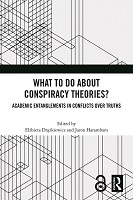What To Do About Conspiracy Theories?
Proposal review
Academic Entanglements in Conflicts Over Truths
| dc.contributor.editor | Drążkiewicz, Elżbieta | |
| dc.contributor.editor | Harambam, Jaron | |
| dc.date.accessioned | 2024-03-08T10:55:10Z | |
| dc.date.available | 2024-03-08T10:55:10Z | |
| dc.date.issued | 2024 | |
| dc.identifier | OCN: 1426022946 | |
| dc.identifier.uri | https://library.oapen.org/handle/20.500.12657/88254 | |
| dc.description.abstract | Increasingly social activists, journalists and policy makers have expressed concern over the proliferation of conspiracy theories in the public space. There is a growing fear of their impact on social cohesion and democracy, their power to erode trust in state institutions and science. These concerns often come with an expectation that it is the responsibility of academics to engage with conspiracy beliefs by countering them. But should they? In this book, contributors show that like everything that relates to conspiracy theories, even the answer to this question is not straightforward and can vary across disciplines and schools, can be influenced by disciplinary ethical codes of conduct, research methodologies, and specific approaches to conspiracy theories. Foregrounding a variety of approaches, from across disciplines (psychology, anthropology, sociology and media studies), academic seniority (from young scholars to full professors), and countries (USA, Ireland, UK, The Netherlands, Sweden, and Greece), the chapters in this book are in deep conversation with each other, offering multiple alternative takes on the issue of what should academics do with conspiracy theories. Together, the book embodies several bold and compelling provocations to dealing differently with conspiracy theories. This timely volume introduces perspectives of scholars representing media studies, anthropology, psychology and sociology and discusses case studies concerning politics, health, environment and security. It will be a key resource for researchers, scholars and practitioners engaged in these fields and will also appeal to anyone interested in conspiracy theories and other related phenomena such as disinformation or fake news. This book was originally published as a special issue of the Journal for Cultural Research. | en_US |
| dc.language | English | en_US |
| dc.subject.classification | thema EDItEUR::A The Arts::AB The arts: general topics | en_US |
| dc.subject.classification | thema EDItEUR::J Society and Social Sciences::JM Psychology::JMA Psychological theory, systems, schools and viewpoints | en_US |
| dc.subject.classification | thema EDItEUR::G Reference, Information and Interdisciplinary subjects::GT Interdisciplinary studies::GTC Communication studies | en_US |
| dc.subject.classification | thema EDItEUR::G Reference, Information and Interdisciplinary subjects::GL Library and information sciences / Museology | en_US |
| dc.subject.classification | thema EDItEUR::L Law::LA Jurisprudence and general issues | en_US |
| dc.subject.classification | thema EDItEUR::L Law::LN Laws of specific jurisdictions and specific areas of law::LNT Social law and Medical law | en_US |
| dc.subject.classification | thema EDItEUR::J Society and Social Sciences::JB Society and culture: general::JBS Social groups, communities and identities | en_US |
| dc.subject.classification | thema EDItEUR::J Society and Social Sciences::JB Society and culture: general::JBC Cultural and media studies::JBCC Cultural studies | en_US |
| dc.subject.classification | thema EDItEUR::J Society and Social Sciences::JH Sociology and anthropology::JHM Anthropology::JHMC Social and cultural anthropology | en_US |
| dc.subject.classification | thema EDItEUR::J Society and Social Sciences::JB Society and culture: general::JBC Cultural and media studies::JBCT Media studies | en_US |
| dc.subject.classification | thema EDItEUR::J Society and Social Sciences::JN Education::JNA Philosophy and theory of education | en_US |
| dc.subject.classification | thema EDItEUR::Q Philosophy and Religion::QD Philosophy | en_US |
| dc.subject.classification | thema EDItEUR::J Society and Social Sciences::JH Sociology and anthropology::JHB Sociology | en_US |
| dc.subject.classification | thema EDItEUR::J Society and Social Sciences::JM Psychology::JMH Social, group or collective psychology | en_US |
| dc.subject.classification | thema EDItEUR::L Law::LN Laws of specific jurisdictions and specific areas of law::LNQ IT and Communications law / Postal laws and regulations | en_US |
| dc.subject.classification | thema EDItEUR::U Computing and Information Technology::UB Information technology: general topics::UBW Internet: general works | en_US |
| dc.subject.classification | thema EDItEUR::J Society and Social Sciences::JP Politics and government::JPW Political activism / Political engagement::JPWC Political campaigning and advertising | en_US |
| dc.subject.other | Conspiracy Theories;Greek environmentalism;HPV immunisation;debunking conspiracy theories;media and communication | en_US |
| dc.title | What To Do About Conspiracy Theories? | en_US |
| dc.title.alternative | Academic Entanglements in Conflicts Over Truths | en_US |
| dc.type | book | |
| oapen.identifier.doi | 10.4324/9781032647463 | en_US |
| oapen.relation.isPublishedBy | 7b3c7b10-5b1e-40b3-860e-c6dd5197f0bb | en_US |
| oapen.relation.isFundedBy | d0e1cd83-8ecb-44a2-bba8-187a50881e77 | en_US |
| oapen.relation.isbn | 9781032647463 | en_US |
| oapen.relation.isbn | 9781040034934 | en_US |
| oapen.relation.isbn | 9781032647449 | en_US |
| oapen.imprint | Routledge | en_US |
| oapen.pages | 136 | en_US |
| peerreview.anonymity | Single-anonymised | |
| peerreview.id | bc80075c-96cc-4740-a9f3-a234bc2598f1 | |
| peerreview.open.review | No | |
| peerreview.publish.responsibility | Publisher | |
| peerreview.review.stage | Pre-publication | |
| peerreview.review.type | Proposal | |
| peerreview.reviewer.type | Internal editor | |
| peerreview.reviewer.type | External peer reviewer | |
| peerreview.title | Proposal review | |
| oapen.review.comments | Taylor & Francis open access titles are reviewed as a minimum at proposal stage by at least two external peer reviewers and an internal editor (additional reviews may be sought and additional content reviewed as required). |

